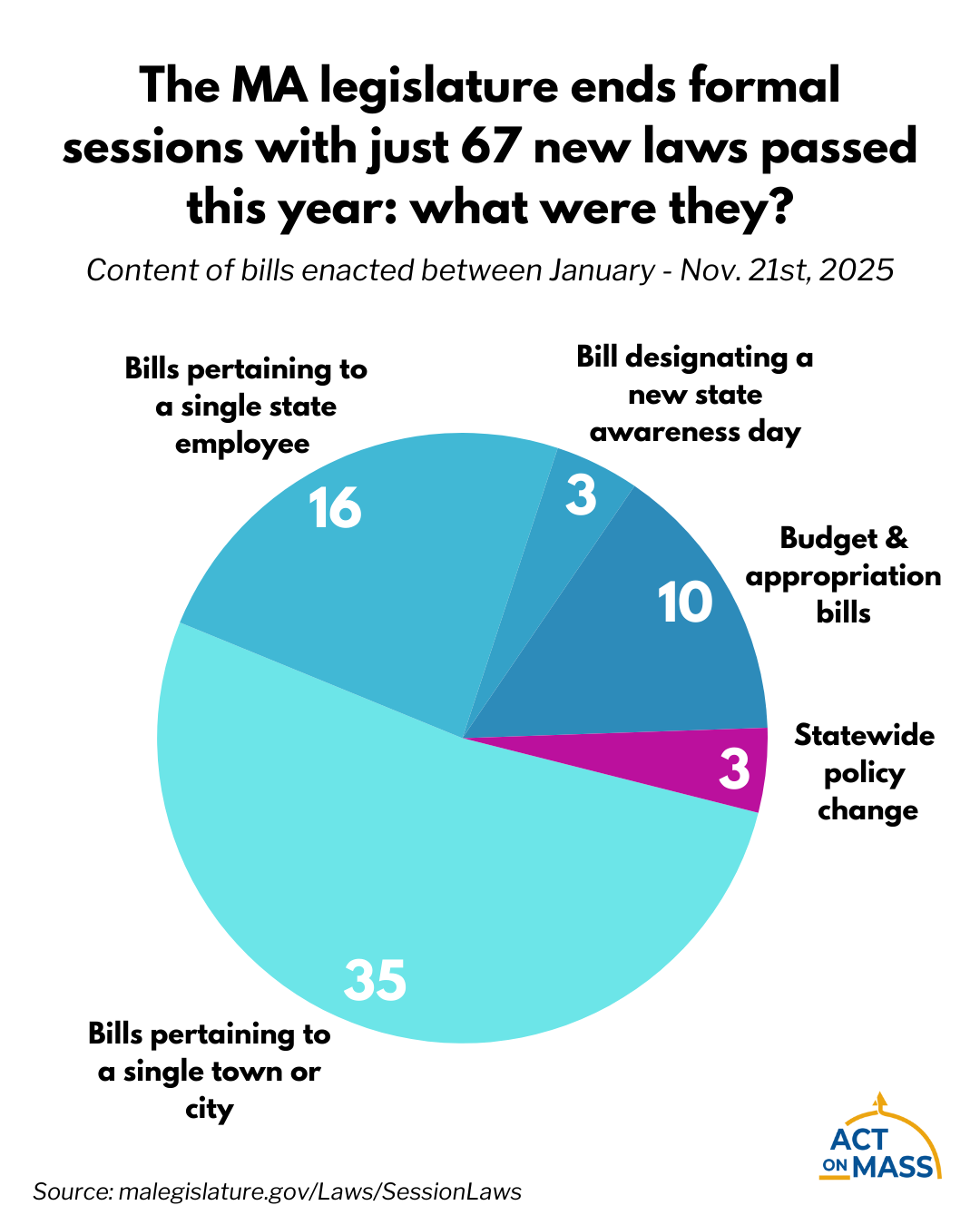The Massachusetts legislature has the third largest Democratic supermajority in the country and yet it is the least productive nationwide. Our state government also holds the dubious distinction of being one of the least transparent state governments in the country.
Act on Mass is leading fight against corruption and inaction in our state government. The organization was instrumental in this fall's successful signature gathering campaign on behalf of a ballot measure that will reform how state legislators are compensated if passed next year.
The following essay is written by Executive Director Scotia Hille and had originally appeared in Act on Mass's weekly newsletter, Saturday Scoop. We are reposting it here because it presents an excellent (and depressing) overview of the first year of the 2025-2026 legislative session.
Our State House's inertia would be unacceptable under any circumstance, but it is particularly disgraceful in light of the perils we face from rising fascism in our country. Our lawmakers should have done much more to protect us from Trump's authoritarianism and cruelty. They must do better next year, or be prepared to face primary challengers.
Guest Essay By Scotia Hille
The rumors are indeed true: lawmakers on Beacon Hill have concluded formal sessions for the year. Any legislative activity for the rest of the year will be in informal sessions, which tend to be poorly attended and are rarely used to pass significant legislation. Also: thanks to an earlier deadline, most committee work is expected to wrap up by the first week in December. This means that representatives may not return to Beacon Hill until next year.
Major takeaway: if you’ve ever considered running for state representative or senator (and you should!), make sure to factor in all that paid time off!
In the year's last formal sessions this week, the only major legislation finalized was a $2.3 billion spending bill that closes the books on Fiscal Year 2025– which ended 4 months ago. Despite skyrocketing energy costs, we are heading into winter without affordability relief– or much else on the books.
As of Friday, 67 new laws had been finalized and sent to the governor this year. As far as we can tell, this was the lowest of any single year of legislative work in the last several decades. We followed up on some earlier analysis to check out what kind of laws made the cut this year.

As you can see, our full-time state legislature has managed to finalize exactly as many new state awareness days in 11 months as new statewide laws. And that’s being generous– here are the three new statewide laws passed:
- A March 28th law to continue allowing cities and towns to allow remote access to public meetings, extending a COVID-era policy. This policy was set to expire on March 31st, so they had to pass this.
- A law moving the state primary date next year to two weeks earlier than the constitution requires, to September 1st, 2026, a date where many in the Boston area change address. In short, an incumbent protection measure.
- The updated SHIELD Law, shoring up protections for providers of transgender and reproductive care in Massachusetts.
Of these three, only the SHIELD Act really qualifies as a new statewide policy change being implemented to protect and benefit Bay Staters. We are glad they passed it! But in 11 months of full-time lawmaking, we should expect more. Make sure to check out Syd's Sprinkles for more on the impacts of inaction.
The legislature has passed a few other policy measures as policy riders on budget bills, including a ban on requiring tenants to pay broker fees that is projected to provide some relief on rental bills. However, even this was only finalized in August, after most new rentals were finalized for the year. For the most part, constituents will wait until next year or later to feel the impact of statewide policy changes.
Here’s the thing. Unlike many residents of Massachusetts, most of our legislators can count on the fact that they’ll have their job next year. In the last election, only 1 in 10 incumbents faced a primary challenge. We have the least competitive state elections in the country.
The lack of competitiveness directly impacts the health of our state democracy. It means that incumbents rarely have to defend their records to ensure reelection. It also means that representatives have little sense of urgency. If you know you’ll have your job in 2027, why rush to get things done in 2025?
So here’s my pitch: with just under a year until next year’s elections, start thinking about what names are going to be on your ballot next year. Even if you support your legislator and appreciate the work they do, it’s better for our democracy (and for their work output!) to have as many options as possible.
I’ve been taking inspiration recently from a group of women organizing in deep-red districts in North Carolina under the “Can’t Win Victory Fund.” They encourage candidates to intentionally run in elections they will lose in order to bring attention to progressive issues, boost voter turnout, and build long-term organizing capacity. At the top of their website, they call out North Carolina’s lack of competitive state elections as an inspiration for their push.
If they can take on incumbents in R+30 districts just to push for a better democratic process, surely we can challenge some entrenched Democratic incumbents in Massachusetts. Even if it's just because somebody should.
Bio
Scotia Hille is the Executive Director of Act on Mass, a statewide nonprofit focused on transparency and accountability in Massachusetts's state legislature. With a background in climate and environmental policy, Scotia has been organizing with Act on Mass since 2020 and became Executive Director in 2024. She is originally from Natick, MA and now lives in Cambridge.
Subscribe to Act on Mass's newsletter Saturday Scoop here.







